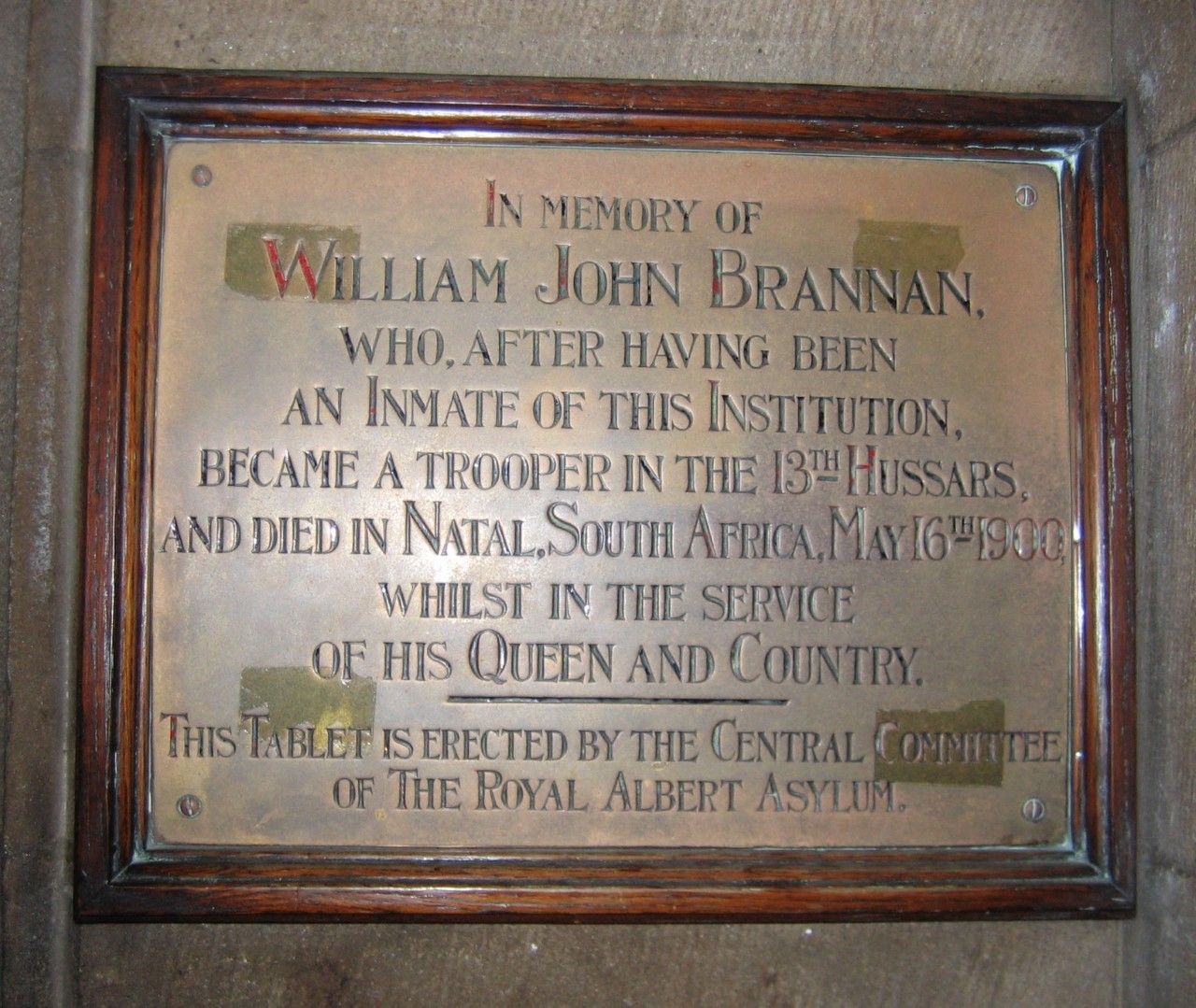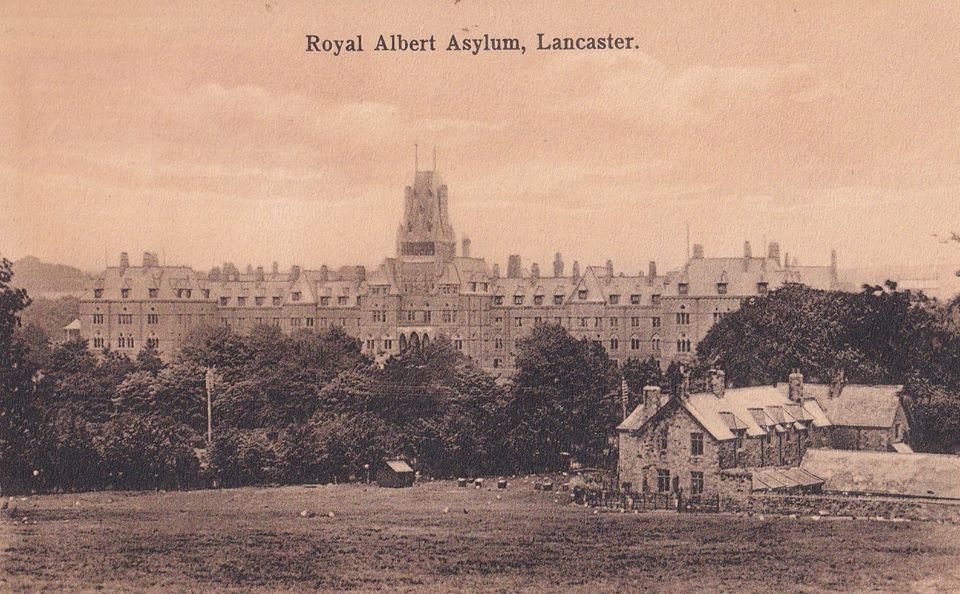-
BereniceUK
-
 Topic Author Topic Author
-
Offline
-
Senior Member
-

-
Posts: 3365
-
Thank you received: 2336
-
-
-
-
|
The plaque can be found in the entrance hall of what was the Royal Albert Asylum, later the Royal Albert Institution, then Royal Albert Hospital, closing in 1996 - it's now a private religious school.
The Royal Albert was "one of 4 regional institutions in England set up specifically for the care and education of children with learning disabilities," and its original title was the "Royal Albert Asylum for idiots and imbeciles of the northern counties." William was admitted circa 1885. (In 1900 the name was changed to 'The Royal Albert Asylum: A Training Institution for the Feeble-Minded belonging to Lancashire, Yorkshire, Cheshire, Westmorland, Cumberland, Durham, and Northumberland.') Until 1913 all patients were children, and they stayed at the asylum for seven years, the intention being to help them have a useful life after leaving. The Royal Albert wasn't originally meant to be somewhere that patients would spend the rest of their lives
www.lancslearningdisabilityinstitutions....out-the-royal-albert
IN MEMORY OF
WILLIAM JOHN BRANNAN,
WHO, AFTER HAVING BEEN
AN INMATE OF THIS INSTITUTION,
BECAME A TROOPER IN THE 13TH HUSSARS,
AND DIED IN NATAL, SOUTH AFRICA, MAY 16TH1900.
WHILST IN THE SERVICE
OF HIS QUEEN AND COUNTRY.
THIS TABLET IS ERECTED BY THE CENTRAL COMMITTEE
OF THE ROYAL ALBERT ASYLUM.
My sincere thanks to Nigel Ingham, of Pathways Associates, for sending me a copy of the photo of the plaque, which he took.
www.lancslearningdisabilityinstitutions....oured-and-remembered
THE ROYAL ALBERT ASYLUM.
The opening of the Ashton wing of the Royal Albert Asylum, towards which Lord Ashton contributed £15,000, is expected to be performed by Lord Ashton on September 26, on which occasion also the subscription portrait of the Chairman, Sir John T. Hibbert will be unveiled, and likewise a brass tablet to the memory of Wm. John Brannan, an ex-patient and trooper of the 13th Hussars, who died in Natal.
The Manchester Courier, Friday 6th September 1901
________________________________
UNVEILING A TABLET.
The visitors and those who had been taking part in the annual meeting proceeded to the entrance hall to witness the unveiling of a tablet to the memory of Trooper Brannan, formerly a patient at the Asylum, who had died in Natal.
Sir John T. Hibbert said although it was a small matter, they might still be proud of the fact that a young man trained in the Institution should not only enter Her Majesty's army but that he should be sent out to South Africa to fight the battles of the country.
Colonel Foster [vice-chairman of the Institution's committee] said he considered it very fitting that the Committee should provide some record of the young man. Brannan was born in 1875, and at ten years of age was admitted to the Institution. He remained for seven years, and got on well at school and in the workshop. He took great interest in the trade of a joiner, and when he was discharged it was thought he would be competent to earn his livelihood as a village cartwright. Apparently his friends were not successful in getting him employment, and he enlisted in the 13th Hussars. It was a fine regiment of cavalry, and 28 years ago he (Colonel Foster) was in barracks with them for six weeks at Aldershot. It had turned out some famous men, including Baden-Powell, the hero of Mafeking - (applause) - and Sir Evelyn Wood. After the first few weeks Brannan took to soldiering and seemed to enjoy it. He went out to South Africa and fought at Spion Kop, and also took part under Lord Dundonald in the relief of Ladysmith. Subsequently he was made orderly in a military hospital at Mooi River, where he met his death. It was interesting to note that when on furlough Brannan visited the Institution and delighted the children by the splendour of his uniform. There had been five or six patients in the Institution who had left the Institution sufficiently well trained as to be able to enlist in the services of the country. - The tablet was unveiled amid cheers, and the inscription read by Colonel Foster. A portrait by the side exhibited Trooper Brannan amidst a group of patients.
Lancaster Guardian, Monday 28th September 1901
__________
So we have William John Brannan, probably born in the north of England, in 1875. The only record I could find for a William John Brannan whose birth was registered in the whole of England for that year was in the Brampton Registration District, Brampton being 8-9 miles east of Carlisle. I visited Carlisle Library but was unable to find any mention of him in the local newspapers in the month following his death. The Asylum's admission records for the late 19th century are held at the Lancashire Record Office, Preston, so a visit there may help with some definite family information.
|



